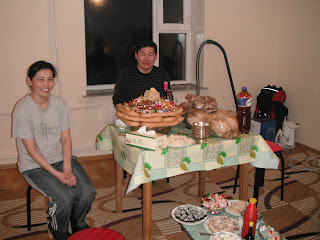 Tsagaan Sar Summary
Tsagaan Sar Summary
Justin, wearing a wolf fur hat (not his), with one of his co-workers.
Now that Tsagaan Sar (white month) is over for most people, it is time for a wrap-up of the activities. So, officially, it was scheduled for 2/3-2/5, however, Tsagaan Sar requires a significant amount of prep time for each family. The spring cleaning is done the week before, which requires that everything be washed, including curtains and linens. Also, buuz (steamed meat dumplings) are the traditional food and many families make 500+, which requires that they start the week before. The dumplings are formed and then frozen outside, only to be steamed when ready to eat. Each family cooks a sheep butt/back and makes a pastry tower (boov), which is covered with white foods (dairy, candies).
Here is the routine:
- · Enter the house and exchange official greetings with everyone, starting with elders (the sayings include “are you doing well?” and “have a good new year”)
- · Sit-down at the table and begin eating the white foods
- · Pieces of the sheep are cut-off and passed around for consumption
- · Salads are presented (mayonnaise and cucumber or cucumber and hyam)
- · Drinks (milk tea, fruit juice, vodka, wine, beer) at any onetime, you may have 3-5 drinks in front of you
- · Family photo albums are passed around (especially to show new people)
- · Buuzs are steamed and eaten
- · Refill drinks
- · Exchange gifts (host gives gifts to visitors, visitors give crisp money to host)
- · Leave
- · Host family repeats with the next group of guests

The amount of food and drink is amazing, and not surprisingly, overwhelming. The key to success is moderation at each host, so that you have the ability to eat towards the end of the day.
We visited 5 families (4 co-workers and the kids that we feed). Also, you have to be invited, unless it is a family member. The host family is typically dressed in full traditional attire (deel). The families typically travel to their parents or grandparents hometowns. This results in some families making many cross-country trips and some families are still celebrating (1 week later).
Basically, everything shuts down for a few days, including all stores and supermarkets. So, we had to “stockpile” starting about 1 week beforehand. We were warned that common foods will be sold-out before and after Tsagaan Sar for at least 1 week. This was very good advice because our local food stores are still sold-out of common items (bread, noodles, hyam [not ham, but a salami-like meat product], etc). Also, we had to withdraw a substantial amount of money from the bank because the ATM (there is only 1 in our town) often runs out of money, especially around the holidays.
Overall, we had a really nice time during Tsagaan Sar and we are appreciative of the families that invited us into their homes.
1 Stoplight Province: Big news of the transportation front! Our towns’ first stoplight was installed at the intersection near our apartment. It happened a few months ago, and since we are the only “town” in our province, we live in a 1 stoplight province. Unfortunately, the concept of a stoplight has not been taught to everyone. Daily, drivers ignore the red light and drive through (not even slowing down), which often results in either people jumping out of the way, collisions with other cars, or near misses. Frankly, the stoplight has made my life more dangerous because I never know if a car is going to stop or not…I have to be on my toes and ready to dive. At least with the previous stop signs, everyone seemed to stop.

No comments:
Post a Comment